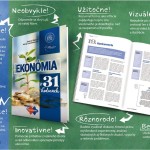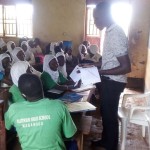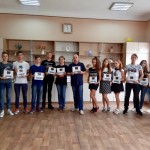The OECD claims that financial literacy is a significant skill in participating in modern society. Pupils should be improving their financial knowledge as early as possible to become active agents of their abilities to plan simple finances. Kids should learn how to plan their spendings and savings and how to build responsible financial behavior.
In Lithuania, economics as a separate curriculum is taught in 9th or 10th grade. Giving financial education 35 academic hours a year. Such a period is not enough to develop a complete set of skills for economic literacy.
The OECD Programme for International Student Assessment (PISA) measured the financial literacy of youth in 2015. It revealed that Lithuania was below the average, which means that financial education in Lithuania was asking for improvement.
Even though in 2014, the national curriculum of Lithuania recommended integrating economics in the primary curriculums (math, history, geography, literature, etc.), there was no clear indication on how to achieve it. Information was generalized, there was no clear methodological framework provided, and the resources of textbooks were significantly limited.
Having this in mind, the Lithuanian Free Market Institute was constantly working to improve financial literacy by creating active economics lessons, giving lectures at schools and universities, and giving speeches about financial education and its significance on national television and radio shows.
But that wasn’t enough. After careful research, LFMI recognized the need to produce an easily understandable, adaptable, and teacher-friendly economics textbook. Economics in 31 Hours was introduced in 2015. The main aim of the textbook was to encourage pupils to realize that economics is not only about money and consumption but about human action in the world of scarce resources.
According to feedback from teachers and students in Lithuania, this textbook was a ‘game changer’ for all economics teachers and pupils.
Economics in 31 Hours
Before the Lithuanian Free Market Institute (LFMI) produced an award-winning textbook Economics in 31 Hours, there was no similar learning material for economics in Lithuania.
Most previously produced textbooks were highly theoretical and did not relate to the surrounding reality; information was not up to date, lacking illustrations, and textbooks were aging too fast. All of this made it difficult and highly time-consuming for teachers to prepare for a good lesson.
Economics in 31 Hours is a textbook for upper secondary schools for 15 to 17-year-old pupils. It is written in a very attractive and user-friendly form. All materials, learning aids, and tasks directly relate economic laws and market forces to the reality and personal lives of the youngsters.
The textbook relates fundamental economic principles and institutes of property, exchange, profit, money, and competition to people’s everyday lives and decisions. All topics are discussed from social, civic, and ethical perspectives, helping to grasp the crucial interrelationships at play and their impact on the advancement of societal well-being and personal fulfillment.
The content is applicable in any context, except that some chapters contain some country-specific information, tax rates or the public expenditure breakdown and proportions, or the legal forms of economic entities. It needs some adaptation for other countries, but this adaptation is quite minor.
What Are The Indispensable Steps to Success?
- Quality of content
Make sure your content is reflecting all essential information of the national curriculum. You can then address it in your own creative way. Talk to various pedagogic specialists, teachers, economics experts to find out what areas you need to cover.
- Know your audience – identify the needs and concerns of teachers and students.
If you want to produce a significantly better textbook, you need to identify the issues teachers and students currently face. You can send questionnaires with the most basic questions that you are interested in. To add, interview students and teachers to provide qualitative information and organize a focus group discussion about texts, tasks, methods, etc.
- Prepare solutions
After you carefully evaluate the issues teachers and students face, find creative ways to deal with them whilst keeping the right fit in terms of your national curriculum. For example, if teachers highlight that it is difficult to prepare for a lesson, you can create an online manual for teachers with up-to-date information and guidelines for a 45min lesson.
- Structure your textbook in a modern way
Use catchy subtitles, introduction, and questions to provoke curiosity. Students will start to think about why they need to understand this topic and it is always easier to learn interesting information.
- Test your material
Launch a pilot project and carefully collect feedback from teachers and students. Update your material regularly and communicate with education professionals to overcome issues raised in the piloting process.
- Identify key stakeholders
Everyone needs a group of allies. Think about the good relationships you keep with media, publishers, and regional education centers. Ask them to assist you in the process of creation and piloting. It is exciting to work with talented people whilst creating a new product.
- Engage in direct communication with schools
It is your audience and most valuable assistance. Be grateful for professional help while creating a textbook, deliver exemplary lessons in some of the schools to present the textbook and its advantages. Organize professional development courses for teachers – webinars can be your perfect fit these days.
- Measure your impact.
Constantly measure the change in students’ perception and know what teachers think about your textbook. This is an important factor for teachers’ recommendations and good reviews.
| DON’T | DO |
| think that you know better | market research and meet your audience needs |
| try to do everything on your own | involve teachers, students, experts, business community, etc. |
| think that everything is already done | dedicate staff and time |
Economics in 31 Hours Traveling Around The World
The textbook was adopted and published by our partners INESS in Slovakia, Bendukize Free Market Centre in Ukraine, and Georgia by New Economic School-Georgia.
The Entrepreneurship and Economics course was launched by Action for Liberty and Economic Development (ALED) in Entebbe, Uganda. This Entrepreneurship and Economics course aims to help students learn about scarcity, trade, entrepreneurship, accounting, government, free market, and exchange in society.
Therefore, the LMFI textbook Economics in 31 Hours was adapted and translated to assist teachers at Entebbe Schools. Around 1000 students will benefit from this first course, and if it is a success, it will be extended.
The Lithuanian Free Market Institute is excited to assist other countries in adopting this textbook and teacher’s manual. We offer all possible assistance in producing quality textbooks to improve the financial literacy of youth around the world.
Continue exploring:
Minding the Gap: Deepening Political Polarization in Poland, Hungary [EVENT]










